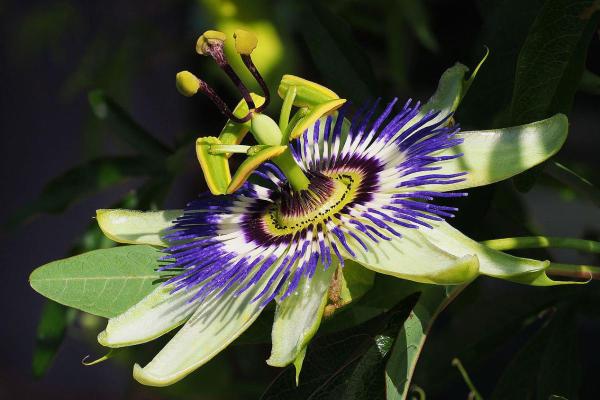Passionflower for Dogs



See files for Dogs
Passionflower (Passiflora incarnata), also known as mayflower, purple passionflower, true passionflower, wild apricot, and wild passion vine, is a fast-growing perennial vine with climbing or drooping stems. It is grown commercially in tropical and subtropical areas for its sweet, seed-bearing fruit, passion fruit. However, passionflower was traditionally used in the Americas and later in Europe as a sedative herb for anxiety, insomnia, seizures, and hysteria. It is still used today to treat anxiety and insomnia in humans and animals.
The following AnimalWised article explains the use of passionflower for dogs, benefits, dosage, and contraindications.
What is passionflower used for in dogs?
Stress is undoubtedly one of the main causes of behavior problems in dogs. The hustle and bustle of our daily lives can be difficult for our pets to cope with, leading to behavioral issues that in some cases require both training and treatment.
Nowadays, there are many synthetic medications with calming properties. However, there are also a variety of natural products that are effective in treating stress and anxiety in dogs, especially in mild or moderate cases. One of these products is passionflower. The flavonoids contained in its dry extract have a calming and anti-anxiety effect that, when combined with appropriate behavioral therapy, can be the solution to many behavioral problems related to stress, anxiety or agitation.
Passionflower works by increasing the level of gamma-aminobutyric acid in the brain. This decreases the activity of certain brain cells, which puts the dog in a calm and relaxed state. Passionflower also keeps serotonin and dopamine levels high in the body, which can also improve your dog's mood and temperament.
Passionflower is often used for dogs that suffer from separation anxiety. Pet owners give their dogs passionflower before they have to leave them alone for long periods of time. Passionflower is also often used before surgery to help the animal relax.
In any case, you should know that although it is a homeopathic product, it is a medicine subject to veterinary prescription and should be administered only under the control or supervision of a veterinarian.
Read this other article if you want to know more about separation anxiety in dogs, how to recognize and how treat the symptoms

Passionflower dosage for dogs
The dose of passionflower should always be prescribed by a veterinarian, as it depends on several factors, such as: the condition to be treated, the concentration of passionflower in the product administered, and whether passionflower is accompanied by other sedative substances.
In any case, keep in mind that it takes about 30 to 40 minutes for the sedative to take effect. Make sure your dog is in a calm environment before administering passionflower. Remember that the effects of passionflower last from 6 to 12 hours.
How to administer passionflower to a dog?
Currently, there are homeopathic medicines for human use that contain passionflower as the only active ingredient. These medicines come in the form of coated tablets, so it should be easy to administer them to your dog. Make sure you administer the dose prescribed by your veterinarian (break the tablet if necessary). Passionflower is also available in herbal stores and natural health stores in liquid or powder form.
Passionflower is a plant that we can grow ourselves as a garden plant, as it does not cause too much difficulty in cultivation. If we decide to grow our own plant, it is enough to take a few leaves and make an infusion with boiling water for a few minutes. For a medium-sized dog suffering from moderate stress is enough about 10 drops of the infusion, taken 1-2 times a day.
If you have doubts about the use of passionflower in any of its dosage forms, you must consult a veterinarian specializing in naturopathy.
If you want to learn more about stress in dogs and how to recognize the symptoms, continue reading this other article on 10 signs your dog is stressed.

Side effects of passionflower for dogs
Toxicity studies with passionflower extracts have shown low toxicity of this substance in dogs, both in acute toxicity studies and in chronic toxicity tests. It is considered relatively safe, but it can cause some side effects, such as:
- Drowsiness
- Dizziness
- Confusion
For this reason, it should not be taken with sedatives.
As a general rule, when starting treatment with this or any other medicinal plant, it is important to monitor the possible occurrence of side effects and immediately notify the veterinarian who determined the treatment.
Contraindications of passionflower for dogs
Although it is an apparently safe product, administration of passionflower may be counterproductive in certain situations:
- Allergy or hypersensitivity to passionflower: or to any of the recipients that accompany the active ingredient.
- Pregnancy and lactation: as the safety of the veterinary drug in these physiological conditions has not been established.
- Concurrent use with synthetic sedatives: such as benzodiazepines, is not recommended.
In general, it should not be mixed with other veterinary drugs, as there are no compatibility studies.
In case of accidental ingestion, the mouth should be rinsed. If large quantities were ingested, a veterinary should be consulted immediately.
Nutrition is an important part of any dog's care. When pregnant, we must care not only for the health of the mother, but also for the health of the puppies she may be expecting. Read on to learn what diet is best for pregnant dogs.
This article is purely informative. AnimalWised does not have the authority to prescribe any veterinary treatment or create a diagnosis. We invite you to take your pet to the veterinarian if they are suffering from any condition or pain.
If you want to read similar articles to Passionflower for Dogs, we recommend you visit our Medicine category.
- Spanish Agency for Medicines and Pharmaceutical Products (AEMPs). Technical sheet or summary of product characteristics: Sedafort oral solution. Available at: https://cimavet.aemps.es/cimavet/pdfs/es/ft/2498+ESP/FT_2498+ESP.pdf
- Tabach, R., Rodrigues, E., Carlini, EA (2009). Preclinical toxicological assessment of a phytotherapeutic product – CPV (based on dry extracts of Cratagus oxyacantha L., Passiflora incarnata L., and Valeriana officinalis L.). Phytother. Beef; 23:33-40







